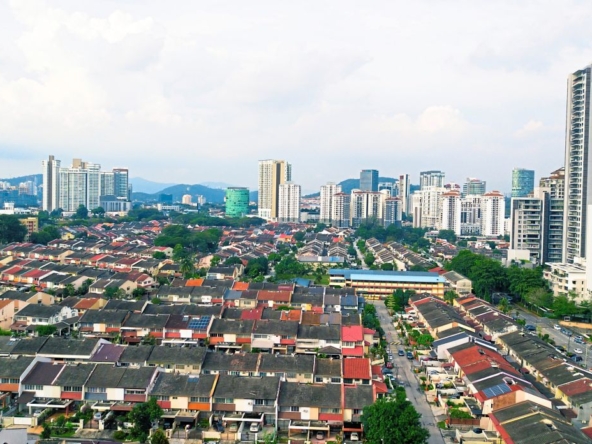You’ve done it! It’s the finale; the closing process of a property purchase. Beyond the excitement, lies a stack of documents, financial costs, and possibly, unexpected challenges. So, let’s take a look at everything you should be aware of when purchasing a sub-sale property.
1. Consult a Lawyer When You Are Ready To Buy or Sell
It is recommended to hire a solicitor or conveyancer to handle the legal work in transferring ownership of the property. The lawyers will prepare the necessary documents and advise on the processes involved.
If you’re the seller, you’d need to clear any outstanding payments such as assessments (cukai pintu), quit rent (cukai tanah), utility bills, maintenance fees, and so on.
The sale and purchase transaction would usually be completed approximately 3 months after the Sales and Purchase Agreement (SPA) is signed.
A senior negotiator with Propnex Realty Sdn Bhd, Eunice Yong recommends purchasers to prepare for the final walk-through on closing day by requesting the property agent to brief on the step-by-step process.
2. Signing of the Letter of Offer, and Buyer Pays an Earnest Deposit

The buyer must sign the Letter of Offer and pay an earnest deposit which is generally 2% to 3% of the property’s selling price. This earnest deposit counts towards the 10% down payment of the property. If the seller decides not to go ahead with the sale, the earnest deposit is usually forfeited (and this is usually stated in the Letter of Offer).
“For the 3% earnest deposit, make sure that it’s to the property agency’s stakeholder account, and not the agent’s own name or the owner’s lawyer stakeholder account,” Eunice cautioned.
The lock-in period is usually 14 days, and in this time, the buyer needs to secure financing. Once the seller has the signed Letter of Offer, the seller’s lawyer will obtain the redemption statement from the bank and prepare all the necessary legal documentation to transfer the property title to the buyer.
This stage usually ranges from 1 week to a month, depending on how soon the Letter of Offer is prepared, and how fast the banker processes the loan application.
Eunice shared a case where the landlord was busy with work. She said, “I managed to convince the buyer to offer the price that the landlord wanted, but the landlord was too busy to meet me to sign the offer letter.
“It has been drafted for more than a month. The buyer and I agreed to give the owner a due date to sign it. If the landlord didn’t manage to sign the document within the specified period, then the buyer would walk away. The landlord signed the document the next day.”
3. Buyer Applies for a Home Loan
In assessing the buyer’s loan application, the bank usually sends one of their panel valuers to assess the property’s value and produce a valuation report. The five keyThe five key factors that financial institutions take into account before approving a home loan application are property value, your income, your current liabilities, your risk profile, your age, and the loan’s tenure.
If all required documents are prepared correctly, it’ll take approximately one or two days for loan applicants to get a verbal answer to whether the bank has approved it. There could be delays if the income and expenditure of the loan applicant cannot support the loan repayment for the property.
According to Eunice, the most common delays that occur are when purchasers don’t pre-check their loan prior to making an offer.
She advised, “They will discover that the earnest deposit is non-refundable, unless a request is made to include a condition that it’s refundable subject to loan approval with a 90% loan margin. In the absence of two rejection letters, the deposit will not be fully refunded. I’d suggest for purchasers to check on loans during the negotiation stage.”
“Purchasers can also check the bank valuation before making an offer to ascertain whether the property’s value matches the asking price,” Eunice added.
4. Sign the Sale and Purchase Agreement (SPA)

Once the buyer has secured a home loan, it’s time to sign the SPA. The buyer will also need to pay the remaining 8% to 9% (depending on how much down payment was made) of the property’s sales price. The buyer must sign the SPA within 14 to 21 working days.
Eunice pointed out that this is a key clause that purchasers should pay attention to as the purchaser needs to do two things in that period – get loan approval, and appoint a lawyer to draft the SPA.
She said, “Both tasks must be completed concurrently to ensure sufficient time for execution.”
She elaborated:
- 14 working days means 3 weeks from the date the landlord signs the offer letter, excluding public holidays and weekends.
- 21 working days means 4 weeks from the date the landlord signs the offer letter, excluding public holidays and weekends.
Once the SPA has been signed, the buyer’s bank will disburse the money to the seller’s bank to redeem the property. Then, the seller’s bank will release all related documents such as the original title and original SPA to the buyer’s lawyer, who will then register the title and mortgage under the buyer’s name. The second stage of loan disbursement will be done after the documents are released to the buyer’s side.
In terms of negotiating favourable terms in the SPA, Eunice advised, “Ensure that the real estate negotiator provides the inventory list to clarify what is included in the offer. This will prevent any potential arguments in the future.”
5. Property Transfer Period
The property transfer period will depend on the complexity of your purchase and the property’s title.
- Freehold properties with individual or strata title: Within 90 working days
- Leasehold properties with individual or strata title: 1 to 3 months for the lawyer to get consent to transfer from the state authority and 90 working days for the transfer process.
More about the Memorandum of Transfer (MOT) here.
6. Settle the Closing Costs
Once the transfer is complete, the seller must pay closing costs to complete the sale of the property:
- Real Property Gains Tax (RPGT): Malaysian citizens and/or permanent residents who sell their property within the first five years of acquiring it will be subject to RPGT. After disposal of the property, the seller is required to submit the RPGT return within 60 days of the disposal date.
- Real estate agent/agency fee: This fee is set at a maximum of 3% of the property’s sale price.
- Legal fee: The legal fee for the SPA is calculated based on the property’s selling price.
- Other fees: These include stamp duty, valuation fees, disbursement fees, settlement fees, bank processing fees, maintenance fees and sinking fees (if applicable), quit rent, assessment fees, and utility fees (Water, electricity/power supply), sewerage, Internet).
When asked about tips for first-time buyers, Eunice said, “They should find a real estate negotiator and solicitor that they can rely on. They will guide you step by step. Additionally, I suggest that you also research the procedures for the closing process.”
Quick Recap
- Common pitfalls: Rushing the process and not understanding the SPA. Take your time, do your research, and seek professional advice.
- Negotiation: Be sure to negotiate terms in the SPA, especially completion dates and deposit schedules. It never hurts to ask.
- Streamlining the process: Having all your documents in order and communicating clearly will make the closing process easier for everyone involved.
So, there you have it – your key to a smooth closing process. Be sure to always take into consideration the time required to buy/sell a property. With this guide and advice from a seasoned real estate agent, and the right legal assistance, we hope that you can embark on the journey of property buying/selling with better confidence.



